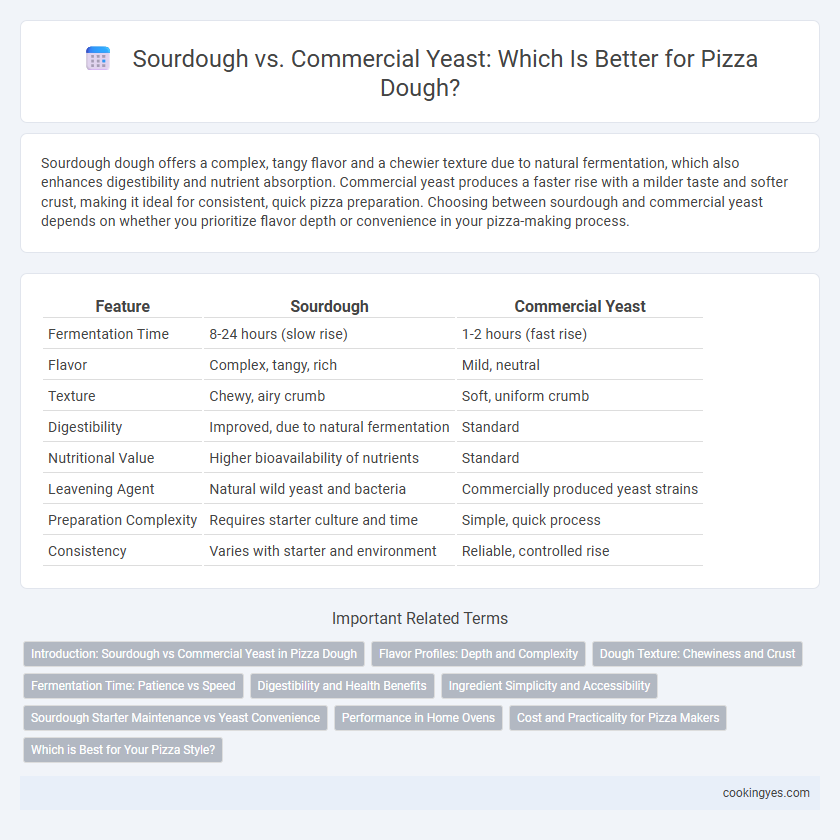Sourdough dough offers a complex, tangy flavor and a chewier texture due to natural fermentation, which also enhances digestibility and nutrient absorption. Commercial yeast produces a faster rise with a milder taste and softer crust, making it ideal for consistent, quick pizza preparation. Choosing between sourdough and commercial yeast depends on whether you prioritize flavor depth or convenience in your pizza-making process.
Table of Comparison
| Feature | Sourdough | Commercial Yeast |
|---|---|---|
| Fermentation Time | 8-24 hours (slow rise) | 1-2 hours (fast rise) |
| Flavor | Complex, tangy, rich | Mild, neutral |
| Texture | Chewy, airy crumb | Soft, uniform crumb |
| Digestibility | Improved, due to natural fermentation | Standard |
| Nutritional Value | Higher bioavailability of nutrients | Standard |
| Leavening Agent | Natural wild yeast and bacteria | Commercially produced yeast strains |
| Preparation Complexity | Requires starter culture and time | Simple, quick process |
| Consistency | Varies with starter and environment | Reliable, controlled rise |
Introduction: Sourdough vs Commercial Yeast in Pizza Dough
Sourdough yeast, a natural leavening agent derived from wild yeast and bacteria, imparts a complex flavor profile and improved texture to pizza dough compared to commercial yeast. Commercial yeast, typically Saccharomyces cerevisiae, offers faster fermentation and more predictable rise times, ideal for consistent pizza production. Choosing between sourdough and commercial yeast depends on desired crust characteristics, fermentation duration, and flavor intensity in artisanal versus mass-produced pizzas.
Flavor Profiles: Depth and Complexity
Sourdough pizza dough offers a richer flavor profile characterized by complex tangy notes and a subtle natural sweetness, thanks to wild yeast and lactobacilli fermentation. Commercial yeast produces a more predictable and mild taste with less depth, providing a cleaner, slightly sweet flavor ideal for those who prefer simplicity. The natural fermentation in sourdough enhances umami and develops nuanced aromatic compounds, making it a preferred choice for artisanal pizza with layered flavors.
Dough Texture: Chewiness and Crust
Sourdough pizza dough offers a chewier texture and a more complex, tangy flavor profile due to its natural fermentation process, creating a crust that is crisp yet airy. Commercial yeast dough tends to produce a softer, more uniform crumb with a less pronounced chewiness and a thinner, less flavorful crust. The choice between sourdough and commercial yeast significantly impacts the dough's gluten development and fermentation time, which directly affects the final pizza's chewiness and crust texture.
Fermentation Time: Patience vs Speed
Sourdough fermentation typically requires 12 to 48 hours to develop complex flavors and improve dough texture through natural yeast and bacteria. Commercial yeast accelerates fermentation, often completing rising in 1 to 2 hours, prioritizing speed and convenience for quick pizza preparation. Extended fermentation with sourdough enhances dough digestibility and crust aroma, while commercial yeast favors rapid production without deep flavor complexity.
Digestibility and Health Benefits
Sourdough pizza dough, fermented naturally with wild yeast and lactic acid bacteria, improves digestibility by breaking down gluten and phytic acid, making nutrients more bioavailable. Commercial yeast dough ferments faster but lacks the probiotic benefits and extended fermentation process that enhance gut health and reduce bloating. Choosing sourdough supports better nutrient absorption and may alleviate digestive discomfort compared to commercial yeast.
Ingredient Simplicity and Accessibility
Sourdough pizza dough relies on natural wild yeast and bacteria, offering a simple ingredient list of flour, water, salt, and starter without commercial additives. Commercial yeast provides a convenient, consistent rise with widely available packets, making it accessible for all skill levels and quick preparation. Choosing between sourdough and commercial yeast balances ingredient simplicity with ease of access for pizza dough enthusiasts.
Sourdough Starter Maintenance vs Yeast Convenience
Sourdough starter maintenance requires regular feedings with flour and water to keep wild yeast and bacteria active, offering complex flavor development and improved dough texture over time. Commercial yeast provides convenience with consistent and rapid fermentation, eliminating the need for daily care and allowing faster dough preparation. Choosing sourdough involves a commitment to starter upkeep for natural leavening, while commercial yeast caters to efficiency and predictability in pizza dough making.
Performance in Home Ovens
Sourdough pizza dough offers complex flavors and a chewier texture due to natural fermentation, but it requires longer proofing times and careful temperature control in home ovens for optimal rise. Commercial yeast doughs rise faster and produce more consistent results, making them ideal for quicker baking with reliable crust texture and oven spring in residential settings. Home ovens often struggle with maintaining the high, steady heat preferred by sourdough, giving commercial yeast an advantage in performance and ease of use.
Cost and Practicality for Pizza Makers
Sourdough pizza dough requires more time and skill to ferment, increasing labor costs and limiting batch size compared to commercial yeast, which offers faster rise times and reliable, consistent results. Commercial yeast is more cost-effective for pizzaiolos due to its ready availability and predictable performance, reducing dough waste and streamlining operations. While sourdough can enhance flavor complexity, commercial yeast remains the practical choice for high-volume pizzerias prioritizing efficiency and cost control.
Which is Best for Your Pizza Style?
Sourdough dough offers a tangy flavor, chewy texture, and natural fermentation that enhances artisan and Neapolitan-style pizzas, while commercial yeast provides a quicker rise and consistent results ideal for classic American or thick-crust pizzas. Sourdough's longer fermentation develops complex flavors and a crispier crust, favored by enthusiasts of traditional, slow-crafted pizza. Commercial yeast suits home cooks and pizzerias seeking speed and reliability without sacrificing a tender, airy crust.
Sourdough vs Commercial Yeast for dough Infographic

 cookingyes.com
cookingyes.com